Khaled al-Jeratli | Hassan Ibrahim | Halim Muhammad
Southern Syria, particularly the city of Daraa at the border triangle with Jordan and Israel, has been a stage for competition among various regional and international forces. The flames of escalation have not died down for 13 years, ever since the spark of the Syrian revolution ignited from there. The tension has remained smoldering under the ashes of agreements and security settlements with the presence of military points and factions of different affiliations.
Although the region is implicitly considered under regime control, many details contradict this notion, especially with the repeated targeting of its forces. Local military groups are spread across Daraa’s towns and villages, each managing its own area and coordinating among themselves. The regime struggles to enter any of these areas without notifying their local factions and leaders.
The issue is not purely internal, as international actors have influenced the region. Many transformations are attributed to Russian interventions, while Iran has left an impact on its security situation. The former role of the United States and Jordan cannot be ignored; the factions in the area were internationally supported through the Military Operations Center (MOC). Even though this center’s work has ended, the province’s location on the southern border near the American base in al-Tanf keeps it within the interests of these two countries, and perhaps also Israel, which is concerned about Iran’s expansion towards the border.
Today, six years after the first settlement allowed regime forces into Daraa, the province remains relatively outside its control. Numerous armed factions are spread across it, some administratively tied to the Military Intelligence (military security) and other regime security apparatuses, while others oppose the regime.
The southern province experiences a state of stalemate that external forces do not wish to change, in light of the regional and international conflicts affecting Syria’s interior, especially Daraa, which lies on the southern borders with Israel and Jordan. This area forms a weak spot through which security could be destabilized.
In this file, Enab Baladi discusses the stages of the development of the security situation in Daraa province, southern Syria, covering two major security settlements and significant security events that altered the shape of the internal conflict, favoring some factions over others.
Observers, experts, and military leaders residing in Daraa today believe, given the context of events, that the region’s future indicates ongoing difficulties and instability amidst the persistent security tension for years.
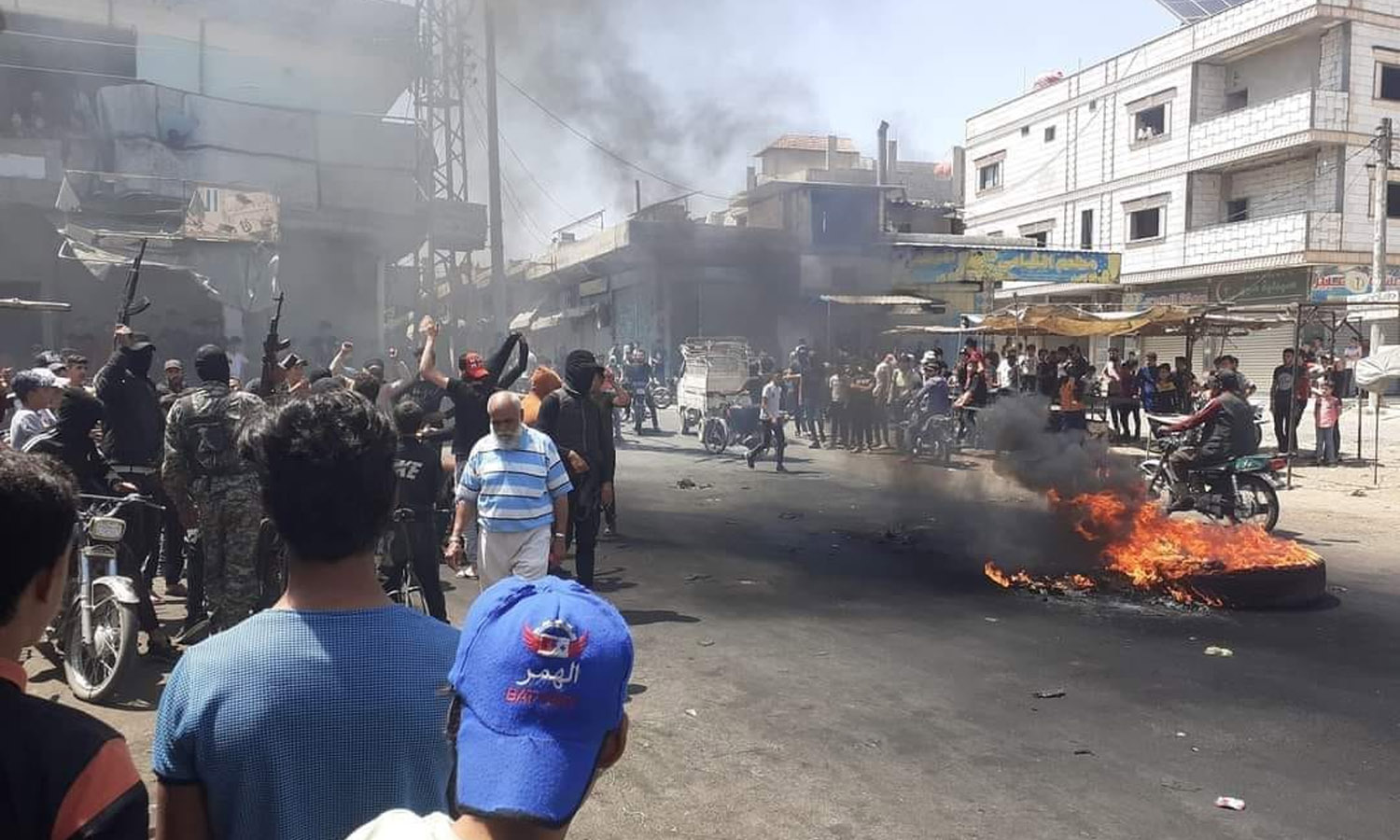
Protesters and local fighters block the road in the city of Nawa, western Daraa, demanding the overthrow of the Syrian regime – August 19, 2023 (Horan Free League)
Change of control through the years
The Syrian regime conducted several security settlements in Daraa, most notably in July 2018, leading to the regime’s control over southern Syria in exchange for several commitments the Russian side promised to implement, such as canceling security demands, withdrawing military forces to barracks, releasing detainees, and reinstating dismissed employees. However, these commitments remained hostage to the regime’s procrastination, and the Russian side did not show seriousness in pressing for their implementation.
An active member of the Central Committee in western rural Daraa told Enab Baladi that after the regime’s control, it attempted to win over notables, municipal heads, and some personalities previously affiliated with the Baath party. However, these components failed to make an impact, leading the residents of Daraa’s villages and towns to accept the Central Committee as an alternative to the regime in several aspects, including security and judiciary.
The regime has always tried to win over local notables and former party members after the settlement to present them as representatives of the area, creating a gateway into the local community. However, this plan did not succeed, and these notables could not influence the province’s residents.
An active member of the Central Committee in western Daraa
The committee member, who preferred not to be named for security reasons, added that the Central Committees did not coordinate with the regime, nor were they factional affiliates, despite including armed factions. He noted that they chose to work cooperatively among themselves, delegating specific individuals to deal with the regime.
He mentioned that the Central Committee in the western rural sector covers about 400,000 people, most of whom have kinship ties in fully regime-controlled areas like the city of Izraa. Due to civilian movement between the province’s towns and cities, direct interaction for service and security purposes arises between the committees and the regime.
The committee member said that the committee contributed to the release of about 1,000 detainees from Syrian regime prisons, most of whom were arrested recently.
In Daraa city, the settlement established a significant Central Committee with weight in the province. It played a role in releasing detainees, organizing public services, solving issues among residents, and organizing demonstrations against the regime, but this situation did not last long.
Years passed under the management of the Central Committee in Daraa city, marked by numerous problems and repeated negotiations with influential Russian forces in Daraa, until July 2021, when the Syrian regime launched a large-scale military campaign against factions based in the city.
At the time, the regime imposed a siege on the city and tried to storm it, but the Central Committee and local factions, supported by other local factions in Daraa, resisted for nearly three months, ending with a new settlement. The Central Committee emerged as a party that negotiated with the regime and the Russians, ending the siege with minimal losses.
Over time, the Central Committee announced its dissolution, leaving the management of the area and negotiations to what is known today as the Daraa Tribal Council.
A former member of the Central Committee in Daraa city told Enab Baladi that the regime’s siege on the city produced a new phase, fostering a social force that organized the city and led it to security discipline. The city is almost free of theft and criminal activities, while security chaos persists in regime-controlled neighborhoods in Daraa city, not lacking theft, robbery, and looting.
The source, who preferred not to be named for security reasons, added that the notables and elders of Daraa city wanted to limit their activities to the city, giving it a tribal nature by representing all components, unlike the Western Rural Committee and the Eighth Brigade, whose activities extended beyond their areas of control.
According to the source, the local community supports the Daraa Tribal Council, which succeeded in combating drug trafficking and achieved positive results. He noted that the Council intervenes on the ground if the regime arrests anyone from the city and intervenes more significantly if the detainee is a woman.
Eighth Brigade rules by force
After the July 2018 settlement, the Eighth Brigade, an extension of the opposition faction “Youth of Sunna Division,” retained its medium and personal weapons, handing over its heavy weapons, including tanks and armored vehicles, to the regime and Russia.
Russia co-opted the Youth of Sunna faction after the settlement and incorporated it into the Fifth Corps formed by Russia in 2016, renaming it the Eighth Brigade. Russia continued to support it until the end of 2021, providing each brigade member with a $200 salary in addition to financial blocks for logistical support, bolstering its military strength in the province.
In early 2022, Russian support for the faction waned, its leadership was linked to the Military Intelligence, and Russian financial support ceased, according to a senior commander in the brigade who spoke to Enab Baladi.
The commander, who spoke to Enab Baladi on condition of anonymity for security reasons, said that circumstances forced the Eighth Brigade to deal with the regime forces, but he refused to disclose the mechanism of this interaction despite the repeated questions posed about it.
He added that all settlements that occurred in Daraa were unsuccessful, their failure stemming from the failure of the original settlement in 2018, as it did not achieve what the regime desired nor met the demands of the province’s residents and notables.
The commander said that the regime and Russia’s control of the south ended the opposition’s control, but the regime itself did not establish control, leading to a security vacuum that necessitated the Eighth Brigade to intervene and try to fill it by imposing its power on the ground. It succeeded in achieving significant results by securing some areas in eastern Daraa.
After the success of its security model in eastern Daraa, particularly in the city of Busra al-Sham, the Eighth Brigade expanded its activities to other areas, heading towards rural areas of the same city, controlling villages and towns there, and intervening in factional disputes in the province’s countryside.
A former opposition faction commander in eastern rural Daraa told Enab Baladi that military components of both the Eighth Brigade and the Central Committees have direct relationships with the regime, despite the public rejection by most of their cadres to deal with the regime.
He added that the regime propagates to its supporters and allies that these components are under its command and work according to its orders, although these factions include thousands of those wanted by the regime and defectors from it.
The commander, who preferred not to be named for security reasons, said that eastern rural Daraa residents accept the Eighth Brigade and Central Committees because they refuse the regime’s presence in their living areas, not because of the positive nature of these parties.
He pointed out that the Central Committee and the Eighth Brigade move freely in Daraa, their members passing through regime checkpoints, conducting security operations here and there, then denying any dealings with the regime.
Settlements to fill the gaps
The security settlements did not stop in 2018; they were repeated across Daraa at different times, but they did not result in any noticeable radical change in Daraa.
Munir al-Hariri, a brigadier general who defected from the regime forces (originating from Daraa and residing in Jordan), believes that the settlements came as a result of the Astana agreements and ultimately led to the separation of southern Syria from the Syrian revolution, forming “cantons” in the south, Ghouta, Rastan, Qalamoun, and other areas where they were conducted.
He added to Enab Baladi that the settlement succeeded in saving the blood of the province’s residents, but failed to achieve its objectives that the Russian side had promised to implement. The security grip is still present, the threat of incursions recurs, deserters are pursued, and the daily risks faced by the population continue.
Regarding the conduct of several settlements, al-Hariri stated they came after security breaches. The regime aimed to withdraw as many weapons as possible from the remnants of the opposition factions and to recruit more people wanted for military service to cover the manpower shortage in its army.
As a result of its weakness, the regime exploited the presence of the Eighth Brigade and central committees to control the deteriorating security situation and sought to support these components to manage the region in a quasi-autonomous manner, deceiving the inhabitants that those managing the area were factions opposing the regime from within the community.
The regime aimed through the settlements to fill security gaps that emerged over time. However, these settlements led to no results, while the regime tended to exploit the Eighth Brigade and central committees to control the security situation and deceive the populace that it was not intervening and that the opposition was managing the area.
Munir al-Hariri, Defector brigadier general from the regime forces
Regime lacks resources
While local forces in Daraa speak of their lack of alignment with the Syrian regime, observers believe that the regime does not have the resources it needs to create a beneficial situation in the southern region, particularly in Daraa.
Aron Lund, a researcher on Syrian affairs at the Century International Center, downplayed the possibility of the Syrian regime benefiting from the chaos in the area.
Lund told Enab Baladi that the Syrian regime in Damascus is trying its best to control the southern region. However, it lacks resources and suffers from constraints due to the arrangements following 2018, under which local groups remain active in their areas.
The researcher believes that some influential figures within the regime might benefit from the turmoil in the area by facilitating smuggling operations or other activities, as the chaos creates a more lenient environment for such practices.
He added that the networks of drug and arms smuggling, which appear to be linked to the regime, also contribute to the instability in the area. However, it is unclear whether the official policy contradicts with certain factions within the regime practicing specific policies for their own benefit.
Some powerful individuals within the regime might benefit from the turmoil through their involvement in smuggling operations. The chaos might help create a more lenient environment for such operations. The drug and arms smuggling networks, many of which seem to be connected to the regime, also contribute to the instability. However, it is unclear whether the official policy contrasts with different factions within the regime that do different things simply to achieve their own interests.
Aron Lund, Researcher specializing in Syrian affairs
An arena for regional and international powers
The reasons for pulling support and dissolving the Southern Front supported by MOC in 2018 were not clear, but former US President Donald Trump considered the support program for the Syrian opposition to be “massive, dangerous, and ineffective.” The Washington Post reported that “collaboration with Russia became a core point in Trump’s strategy towards Syria,” adding that the decision was a result of a US-Russian understanding.
Meanwhile, Russia’s influence was still present and effective in Daraa, having played a pivotal role with Jordan, Israel, and the United States. It had significant political and military weight in the region, although Russia’s influence experienced periods of instability with reduced influence during the ongoing Ukraine war and increased presence post the Al-Aqsa Flood operation carried out by Palestinian resistance factions in Gaza in October 2023.
The void left by Russia in the south at the start of its war against Ukraine was filled by Iran. Moscow then returned with its forces and reinforced its presence along the Golan Heights by establishing several monitoring stations. Russia also resumed its military patrols in the south at the beginning of November 2023, after an absence of more than a year, with a military patrol moving south of Quneitra between the towns of al-Malaqa and Ghadir al-Bustan near the Safra outpost of the regime’s 90th Brigade in the southern province.
The Israeli Intelli Times research center stated that the Russian Ministry of Defense’s eyes are on Israel, documenting the activities of the Russian police in the Golan Heights not to monitor military provocations but to gather intelligence, technology, and military information about the capabilities of the Israeli army and the performance of Hezbollah.
Russia increased the number of its military sites in Syria from 105 to 114 between mid-2023 and 2024, primarily spreading within new sites from which Iranian militias withdrew in the south, particularly in Quneitra province.
The Jusoor Center for Studies considered the spread of Russian forces in new military sites in Syria as a continuation to deprive Iranian forces from spreading in strategic sites, pointing to the diverse weapons present in the Russian military sites, including an air superiority with combat and reconnaissance aircraft.
The latest Russian moves include establishing a military base in Quneitra near the occupied Golan Heights, in the 90th Brigade affiliated with the regime forces.
Dr. Abdullah al-Assad, Dean of the Faculty of Political Science at the Al-Ahliyya University, believes that since Russia’s military intervention in Syria in 2015, Russia established understandings and conditions in the southern region based on protecting the borders with Israel. Russia established several military points, took over security and patrols duties, and secured a strong foothold.
Al-Assad told Enab Baladi that the recent establishment of the Russian base in the 90th Brigade area aims at controlling any tension and preventing attacks between Israel and Hezbollah-affiliated groups.
While the goal is to protect and prevent any operations from the occupied Golan, according to al-Assad, the reality is a greater assertion of Russian control in the south. Moreover, Russia is also trying to strengthen its presence in the north after establishing a military base in Ayn al-Arab at the beginning of last August.
Al-Assad believes Russia is currently seizing opportunities through several understandings with regional countries, whether with Turkey or Israel, aiming to achieve geopolitical gains and to expand its presence in the Syrian arena.
Tehran is present to pressure
Iran wields significant influence in the cities and towns of southern Syria through its arms and militias, including the Revolutionary Guard Corps and Hezbollah, compared to other foreign military forces in Syria. Its military sites number 20 in Quneitra, 16 in Daraa, and 13 in As-Suwayda.
Despite the local opposition to the presence of Iranian and Russian forces in Daraa, Iran’s influence differs from that of Moscow because Israel opposes this presence and has started targeting Iran’s proxies in Syria since 2013 via the “operations between wars” campaign, targeting Iranian forces and Hezbollah and their allied factions.
According to an analysis by the Malcolm Kerr-Carnegie Middle East Center, Iran worked through opportunistic local militias aiming to achieve influence and economic gains and establish security. Its members and leaders are known for changing allegiances. Iran enjoys a significant advantage in southern Syria, particularly along the axis between rural Damascus and Quneitra provinces.
The center states that Tehran not only enjoys a wide presence but also possesses a robust security infrastructure, while Russia has this infrastructure in the region, but it is less entrenched on the ground than Iran’s.
Al-Assad considers Iran the biggest beneficiary of the regional powers amid the chaos in Daraa today because it has elements and militias along the Syrian-Jordanian border, giving it the ability to carry out whatever it wants, including arms and Captagon smuggling, and creates fears for Israel.
Based on Iran’s significant presence and its proxies, al-Assad believes the balance of power in the southern region and Daraa is completely in Iran’s hands.
Syrian conflict studies researcher Mahmoud al-Hussein told Enab Baladi that the presence of Russians in Daraa primarily stems from the 2018 understandings with the US and Israel to ensure the latter’s safety, which eventually led to the withdrawal of some opposition factions from the south to the north of Syria.
In contrast, al-Hussein states that Iran’s presence in Daraa—through militias or its penetration into Syrian security apparatuses—is aimed at possessing a negotiating and pressuring tool that Iran could leverage for other issues with Israel or Washington one day, downplaying the potential threat of Iran to Israel on that front.
The complex scene and the resulting chaos in Daraa are outcomes of an overlap between international forces like Russia and regional ones like Iran and Israel, along with local forces from the Syrian regime and remnants of the opposition.
Mahmoud al-Hussein, Researcher in conflict studies
Daraa is crucial for Israel’s security
The understandings to control the southern front and avoid escalation, dating back to 2018 when discussions took place between Israeli Prime Minister Benjamin Netanyahu and Russian President Vladimir Putin, did not prevent repeated Israeli attacks in southern Syria in response to sources of fire.
Israel always claims responsibility for these attacks, stating they are a response to rockets fired from within Syrian territory, such as the Israeli army targeting the town of Tseel in western Daraa in last July after two rockets were launched from within Syrian territory towards the Golan, according to the Israeli army.
According to The Washington Post, the conflict between Iran and Israel is the most likely to explode, having quietly engaged each other in a “shadow war” on land, in the air, and at sea for years, occasionally through proxies.
The Israeli Alma research center highlighted in a 2020 study that an Iranian intelligence unit, known as the “Golan File,” aims to build infrastructure for a “terror cell” in southern Syria as a proxy for Hezbollah.
This activity aims at collecting information and carrying out security tasks against Israel, involving local Syrian residents who know the area well and can blend in with the local populace.
Aron Lund, a Swedish researcher specializing in Syrian affairs at the Century International Center, believes that the Israeli-Iranian conflict significantly contributes to the problems in southern Syria. He noted that Israel pushes back against the deployment of Iranian military officials or their militias in the area.
Lund doesn’t rule out that Israel might play a role in supporting local groups to gather information about the area and create disturbances for its enemies, saying that Israel would simply exploit the existing unrest, rivalries, and security gaps.
The UAE and Jordan’s shifting stances
The UAE played an influential role in the Daraa equation. After providing support to armed opposition factions, it contributed through its agents to bringing the region under Russian influence. Khaled al-Mahamid, a Syrian businessman residing in the UAE since 2000, was considered the UAE’s man in the Syrian opposition, especially in the city of Daraa, where he hails from.
Al-Mahamid was the enigmatic figure and main mediator who supplied the Southern Front alliance of armed opposition factions with Emirati funding. He also acted as an intermediary at the start of the Syrian revolution between the regime and the locals in the province before moving to support the revolution.
With support from the UAE and MOC, Ahmed al-Awda who shifted allegiances multiple times, played a role in the collapse of opposition control over Daraa, handing it over to Russia and regime forces without a fight. Thus, the UAE’s marks remain evident in the Daraa scene.
Jordan’s stance towards the Syrian regime was not consistent. After King Abdullah II of Jordan was the first Arab leader to call for Bashar al-Assad to step down following the outbreak of the revolution in 2011, he was among the first to work on reintegrating and dealing with the Syrian regime.
This stance from Jordan, a bordering country with Syria, reflects the pivotal role it played in the political and military landscape, especially in Daraa. In mid-2013, the MOC room was based in Jordan, and Jordan entered training programs for Syrian opposition forces, leading the Syrian regime to accuse it of facilitating the crossing of “terrorists” through its borders.
To this day, relations remain tense between the regime and Jordan, as drug smuggling across the border continues to trouble the neighboring country. Jordanian officials have issued threats of military intervention in Syria to eliminate smuggling networks, and the Jordanian Air Force began airstrikes in southern Syria in May 2023, marking an unprecedented escalation in Jordan’s involvement in Syria since 2011.
Regarding Jordan’s role in southern Syria, a report by the Jusoor for Studies Center stated that it is still tied to continued cooperation and coordination with the regime. However, there is also an increasing reliance on Jordan’s military and security power to reduce the threat of security risks coming from Syria.
The report considered that the continued escalation of smuggling operations would pressure Jordan and the Arab states, leading to a reduction in security and military coordination between the parties. Expectations are that Amman will increase its pressure on Washington to supply it with the necessary equipment and technologies to monitor and protect the borders.
The center ruled out the possibility that Jordan’s role would evolve into conducting large-scale military operations inside Syria unless there is an American, then Arab, direction to confront Iranian militia activities in Syria.
The future of the south
The state of security chaos in the province for years and the infiltration of foreign forces have not driven the parties to seek ways to end this situation, it seems. Local parties work to avoid further losses rather than achieve gains, local leaders told Enab Baladi.
Defector Brigadier General from the regime forces, Munir al-Hariri, predicted during his talk to Enab Baladi that Daraa province would witness more security chaos due to the numerous militias affiliated with security branches and their conflicting interests.
Researcher in conflict studies, Mahmoud al-Hussein, believes that the regime is weak and fragile in Daraa for two reasons: the Russian presence allows some opposition factions to exert pressure on the regime, and the regime is unable to militarily cover the area as it is exhausted after 13 years of fighting and military battles. He noted that the regime is incapable of control and positioning.
According to al-Hussein, the regime today can only attempt to engage the area in stories of assassinations, breaches, kidnappings, and fueling conflicts among the southern components, like those that occasionally occur between Daraa and As-Suwayda.
Dean of the Faculty of Political Science at Al-Ahliyya University, Abdullah al-Assad, predicted that the security situation in Daraa province in southern Syria would worsen.
He added that resistance against the Syrian regime is growing day by day, evidenced by the recent targeting of the Daraa governor along with other regime officials in an attack on September 4, which resulted in injuries.
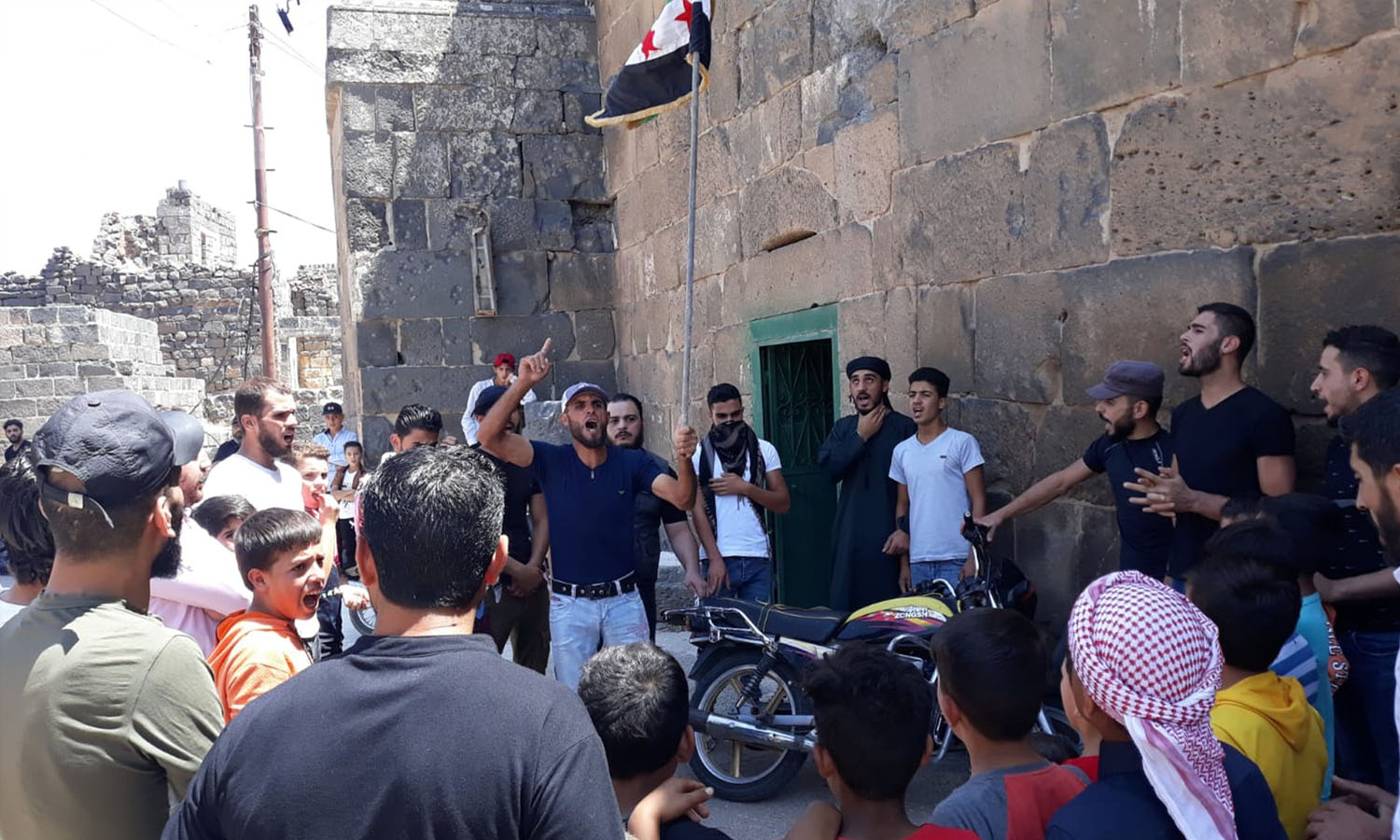
A demonstration calling for the overthrow of the Syrian regime in the city of Busra al-Sham, eastern Daraa – August 18, 2023 (Horan Free League)
if you think the article contain wrong information or you have additional details Send Correction
النسخة العربية من المقال
-
Follow us :












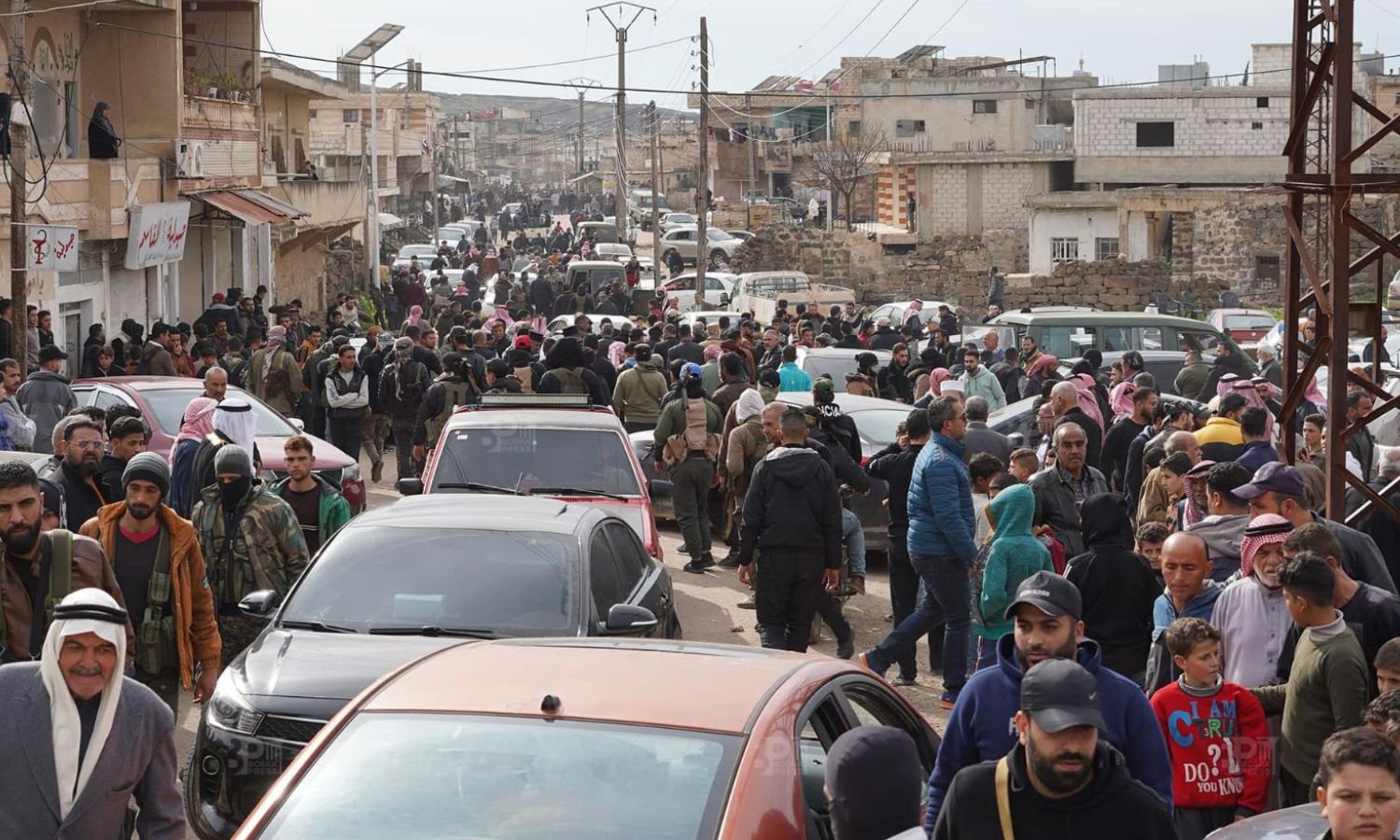
 Civilians and local fighters during a tribal reconciliation in the town of Mahja, northern Daraa - February 13, 2024 (Bosra Press/Facebook)
Civilians and local fighters during a tribal reconciliation in the town of Mahja, northern Daraa - February 13, 2024 (Bosra Press/Facebook)





 A
A
A
A
A
A

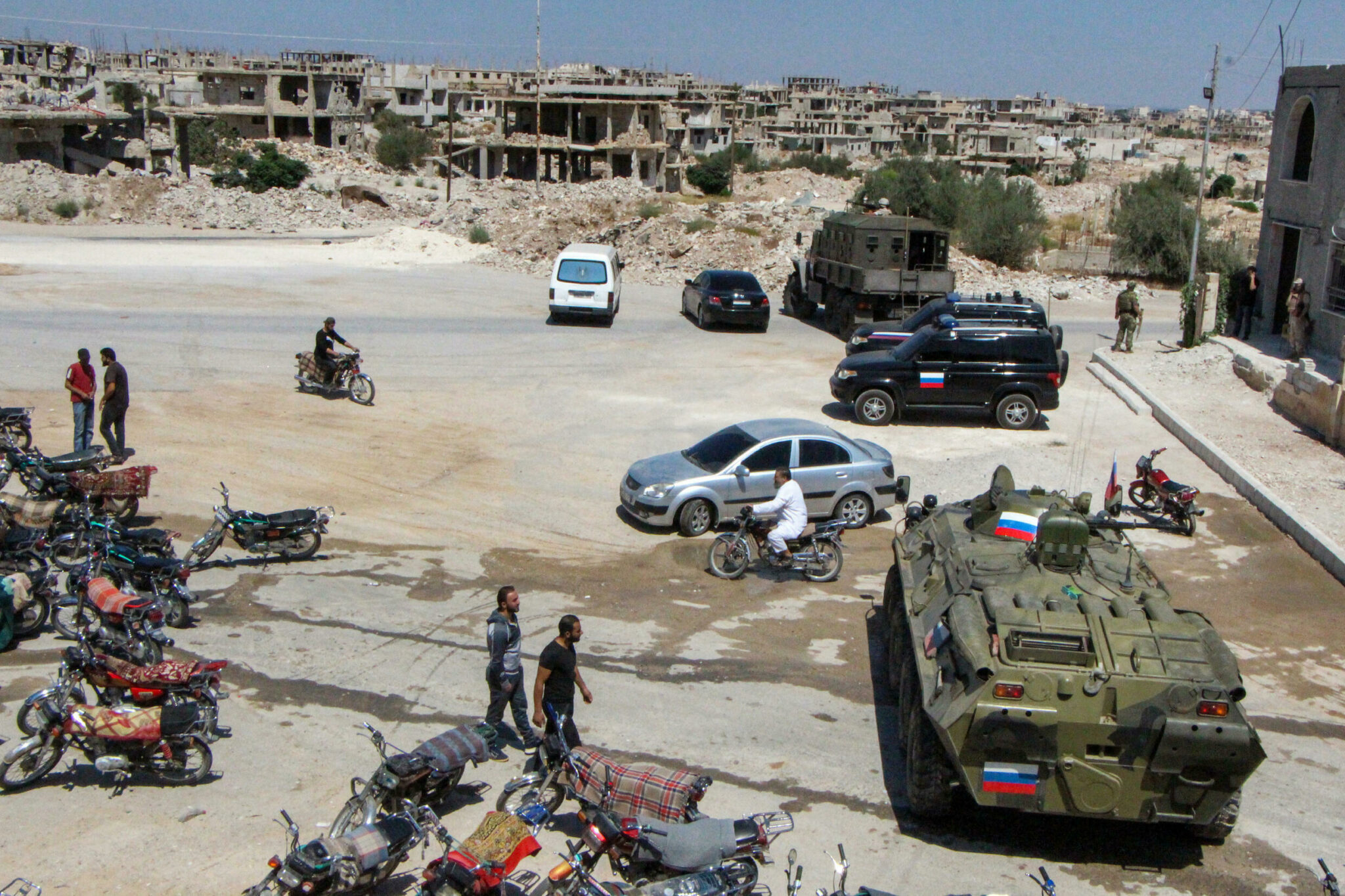
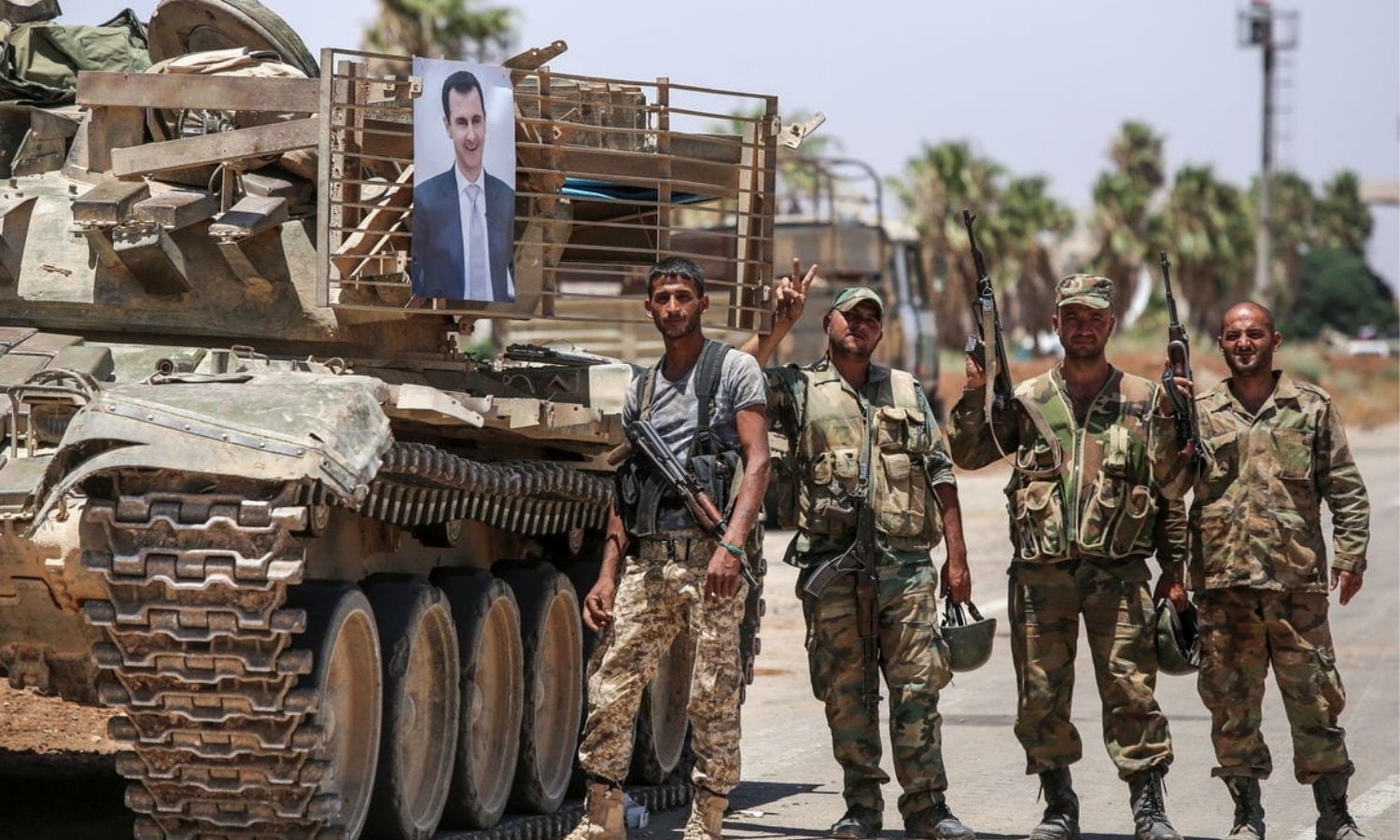


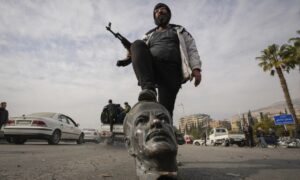
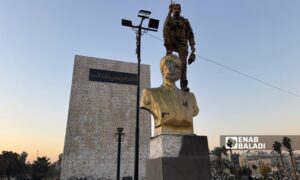

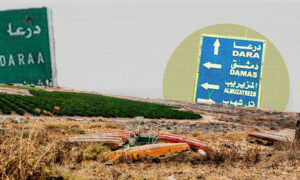
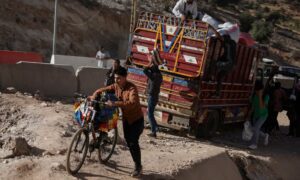
 More In-Depth
More In-Depth